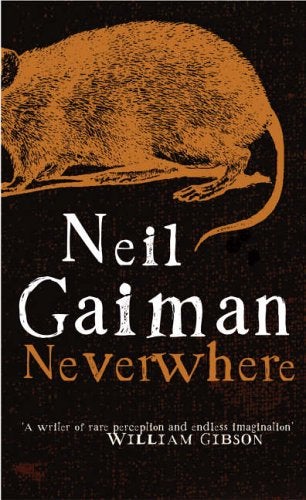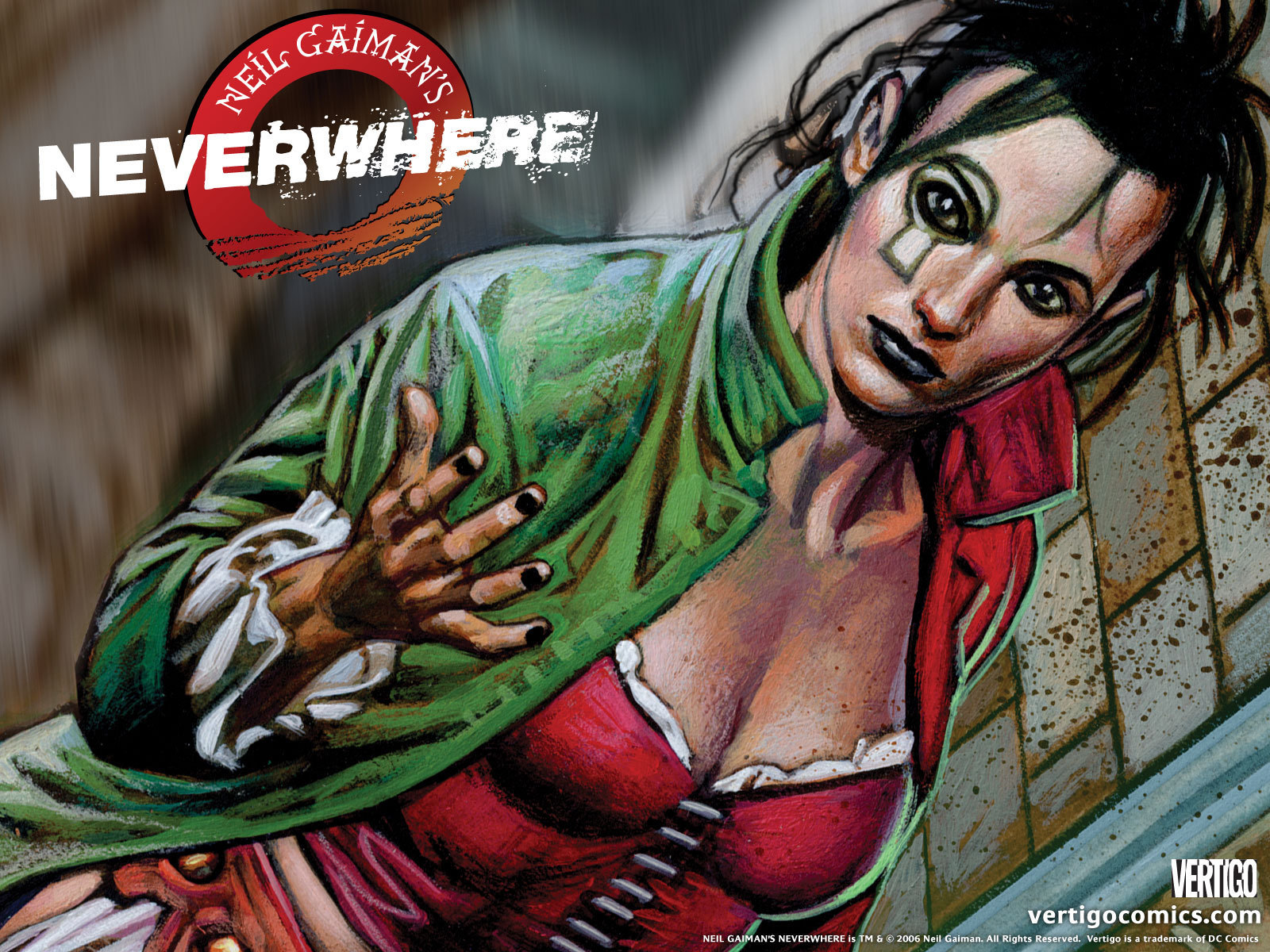I do not like fantasy. I wrote it early on in the blog and I have never enjoyed wishy-washy stories about dragons, elves, pixies, ogres, hobbits, fairies, giants, demons, witches and wizards. However, I definitely do like Neil Gaiman. Prior to purchasing this, I read half of 'American Gods' and decided I needed to read more of his work as I found him to be witty, imaginative and an excellent storyteller. Until I read the Author's Note of this edition of 'Neverwhere', I had thought that the television series had been based on the book but it is, in fact, the other way round. However, Gaiman diplomatically says that the televised version of his story hadn't been 'necessarily bad' it had missed out large parts that he thought were essential and so he wrote the novel.
The novel focuses on Richard Mayhew, an unfortunate city worker in London who has a demanding and not-at-all understanding fiancée, who one night stumbles across a wounded girl on a London street and decides to help her. The next morning, he awakes to find that nobody recognises him, taxis don't notice him and his world has been turned upside down. He enters a new world, 'London Below' (as opposed to 'London Above') and begins a quest with Door, the wounded girl who he helped before.
London Below is a dingy, dirty and dangerous place which slightly mirrors and satirises life in the 'real' London. There is a floating market, where you can buy 'anything,' including "Rubbish!...Junk!...Garbage! Trash! Offal! Debris! Nothing whole or undamaged! Crap, tripe and useless piles of shit! You know you want it." Sounds like an average trip to Primark to me. Gaiman also amusingly gives literal meanings to place names: there is an angel at Islington, there are a skulk of friars at Blackfriars (thanks Google for the collective noun there) and Knightsbridge has a terrifying bridge, encompassed by night.
Gaiman's prose is often humorous and quite blokey for a fantasy writer: "Can I help you?' asked the footman. Richard had been told to fuck off and die with more warmth and good humour." This is very occasionally juxtaposed with some uninteresting exchanges between the characters: "Now would be a very bad time to discover that one was claustrophobic, wouldn't it' 'Yes,' said Door. 'Then I won't.' said Richard. Despite that snooze-inducing exchange, this does not detract from a superb storyline.
It has taken me around two years to get round to reading 'Neverwhere.' I knew little about it other than Gaiman talking on a podcast about 'American Gods' discussing how he needed to add little bits of information about London for his American readership who may not understand the various parts of the city. Once you get reading the novel, you quickly get round to knowing and loving the characters of Richard, Door, the Marquis de Carabas and Hunter, whilst having a grim amusement and fascination of Mr. Croup and Mr. Vandemar. Whilst I 'don't like' fantasy, I think if you don't enjoy Neil Gaiman's writing ('American Gods,' 'Stardust' and this are all essential reading), you essentially are discounting novels of huge amounts of fun and imagination. These books contain them in abundance.
Key quotes
- "Metaphors failed him. He had gone beyond the world of metaphor and simile into a place of things that are, and it was changing him."
- "Richard wrote a diary entry in his head. Dear Diary, he began. On Friday I had a job a fiancée, a home, and a life that made sense. (Well, as much as any life makes sense). Then I found an injured girl bleeding on the pavement, and I tried to be a Good Samaritan. Now I've got no fiancée, no home, no job, and I'm walking around a couple of hundred feet under the streets of London with the projected life expectancy of a suicidal fruitfly."
- "The only advice I can give you is what you're telling yourself. Only, maybe you're too scared to listen."
Other thoughts
- I enjoyed Gaiman's description of how the BBC presented 'the Beast' as looking "more like a rather sad looking cow."
- Enjoying Potter, the recent BBC adaptation of Mr. Norrell and Jonathan Strange are rather troublesome in my long-held view that I don't like fantasy. I think what I might mean is I don't like 'Lord of the Rings' or fantasy that focuses on non-human beings. I can deal with 'realistic' fantasy if that makes sense.
- The other day I spent a few minutes looking around Waterstones fruitlessly attempting to locate the animated version of this story as I was interested to see how the characters were presented. Penny found it in a second. Having flicked through it though, the characters were not at all how I imagined them to be. I don't imagine Door to look anything like that Marvel comic-like character below; I thought of her more as a grubby girl out of a Dickensian poorhouse.


No comments:
Post a Comment